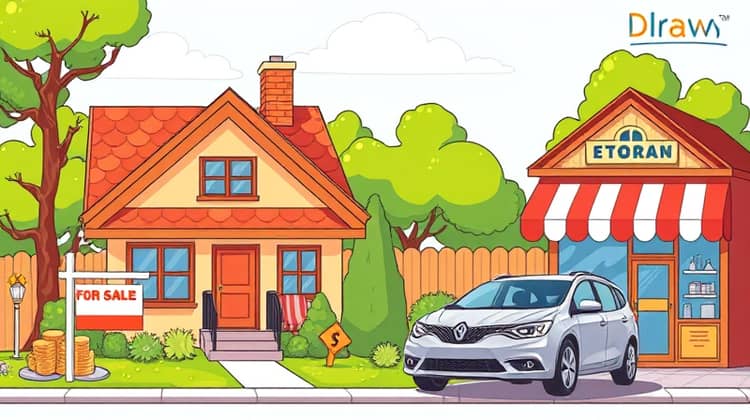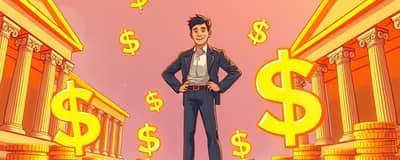Secured loans are a popular financing option for individuals looking to borrow funds while minimizing risk for lenders. By using collateral—such as property or savings accounts—borrowers can often access lower interest rates and larger loan amounts compared to unsecured loans. This article will delve into the intricacies of secured loans, including how they function, the various types of collateral, reasons for borrowing, and their advantages and disadvantages.
It's essential to understand the nuances of secured loans before making a commitment. The implications of securing a loan with collateral can affect not only your financial health but also your personal assets. Let's explore all these aspects in detail to help you make an informed decision regarding secured loans.
How does a secured loan work?

A secured loan is a financing option that requires the borrower to pledge an asset as collateral to guarantee the loan. In the event of default, the lender has the legal right to seize the collateral to recover the owed amount. This mechanism significantly reduces the risk for lenders, making secured loans an attractive option for both parties.
Typically, the collateral can take various forms, ranging from real estate to vehicles or savings accounts. The loan amount is usually determined based on the value of the pledged asset, and the borrower is accountable for repaying the loan within a specified period.
- Borrower applies for the loan and provides details of the collateral.
- Lender assesses the value of the collateral and checks the borrower's creditworthiness.
- If approved, the loan amount is determined and disbursed to the borrower.
- The borrower makes regular payments according to the agreed terms. If default occurs, the lender can claim the collateral.
Understanding these steps can empower borrowers to navigate the secured loan process with greater confidence, ensuring they are fully aware of their rights and obligations. Now, let’s explore why people often pursue secured loans.
Common reasons for secured loans

Secured loans are frequently sought out for various financial needs, particularly because they can provide access to larger sums of money. For instance, many individuals turn to secured loans when considering home improvements or renovations, allowing them to leverage their existing home equity to improve their living spaces and potentially increase their property's market value.
Another common reason for obtaining a secured loan is debt consolidation. Borrowers may choose to secure a loan against an asset to pay off higher-interest debts, thereby simplifying their financial obligations and often reducing their overall interest costs.
Types of collateral loans

Many assets can serve as collateral for secured loans, making these financing options versatile and appealing to a wide range of borrowers. One common type of collateral loan is a home equity loan, where homeowners can borrow against the equity they have built up in their property. This type of loan typically offers favorable interest rates due to the lower risk involved for the lender.
Another example is auto loans, where borrowers secure financing for a vehicle by using the vehicle itself as collateral. This provides lenders with assurance, making it easier for borrowers to obtain funding, even if they have less-than-perfect credit.
- Home equity loans
- Auto loans
- Personal loans secured by savings or certificates of deposit
- Business loans secured by business assets
Recognizing the various types of collateral loans available can help borrowers choose the one that fits their financial circumstances and objectives best. With this information in mind, it's crucial to understand how one can obtain a secured loan effectively.
How to get a secured loan?

Securing a loan is a process that requires careful consideration and preparation. Before approaching lenders, it’s advisable for potential borrowers to evaluate their credit score, as this will influence the terms of the loan. A higher credit score can result in lower interest rates, which is especially beneficial when using collateral. Additionally, understanding the value of the collateral being offered can assist in negotiations with lenders.
Next, borrowers should shop around for different lending options, comparing interest rates, loan terms, and fees associated with each loan. This research can help ensure that they find the most favorable arrangement for their financial situation.
- Review your credit report and score.
- Determine the value of the asset you're using as collateral.
- Research and compare lenders and their offerings.
- Prepare necessary documentation for the application process.
Taking these steps can significantly enhance a borrower's chances of securing a favorable loan deal. As you assess options for secured loans, it's important to weigh their pros and cons to make an informed choice.
Pros and cons of secured loans

Secured loans offer a distinct set of advantages and disadvantages that potential borrowers should carefully consider. Among the primary benefits is the lower interest rate, which can make secured loans more affordable than unsecured loans. Additionally, these loans may allow borrowers to access larger amounts of money since they are backed by tangible assets.
However, the primary risk associated with secured loans is the potential loss of the collateral if the borrower fails to repay the loan. This can lead to severe financial consequences, making it critical for borrowers to evaluate their repayment ability closely.
- Lower interest rates compared to unsecured loans
- Access to larger loan amounts
- Potential tax benefits in certain cases
- Building credit if payments are made on time
In conclusion, while secured loans can be beneficial for many borrowers, the stakes can be high due to the potential loss of collateral. Prospective borrowers should carefully assess their situation before committing to a secured loan to determine if it aligns with their financial goals.














